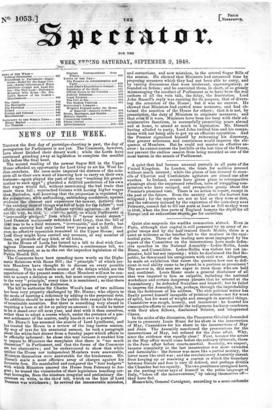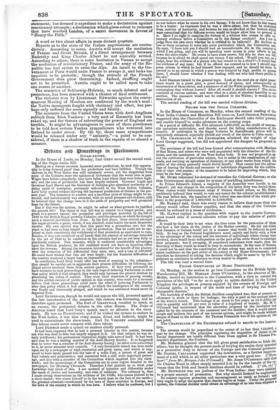Quiet also suspends the warlike commotion abroad. Even in Paris,
although that capital is still possessed by an army of re- gular troops and by the half-trained Garde Mobile, there is a quiet as welcome as the briefest lull to the mariner in the equi- noctial gales. Three of the leading men most impugned by the report of the Committee on the insurrections have made defen- sive speeches in the National Assembly—Ledru-Rollin, Louis Blanc, and Caussidiere. Ledru-Rollin was violent but not im- pressive, bold but not imposing ; while he disclaimed the Red Re- public, he threatened his antagonists with civil war. Altogether, he made an exhibition that raises the question how one so defi- cient in real ability came to be placed in a position so prominent t The answer is, that men are eager to trust those who are bold and confident. Louis Blanc made a general disclaimer of all that was imputed to him as culpable, including the national workshops and certain dangerous phrases that be uttered at the Luxembourg ; he defended Socialism and himself; but he failed to impress the Assembly, less perhaps, through the improbability than the feebleness of his address. The able political writer has finally proved himself incapable of political action—not for want of spirit, but for want of weight and strength in material things. Caussidiere was rough, homely, and incoherent.: he boasted his cosmopolite efforts to reconcile the indigenous hackney-coachmen with their alien fellows, disclaimed Sobrier, and vituperated Chenu.
In the midst of the discussion, the Procureur.Geueral demanded leave to prosecute Louis Blanc for his share in the insurrection of May, Caussidiere for his share in the insurrections of May and June. The Assembly sanctioned the prosecutions for the insurrections of May, but refused for the June affair. Why, since the evidence was equally clear ? First, because the actors in the May affair would come before the ordinary tribunals, those in the June affair before courts-martial. Secondly, we suspect, because complicity in the last insurrection was more extended and formidable: the former was more like a partial mutiny, the latter more like civil war ; and the revolutionary Assembly shrank from keeping up or renewing a contest in which the boundary between friends and foes is very ill defined, and perhaps divides the Chamber but too equally. The two gentlemen arraigned have, as the parting visiter says of himself in the polite language of Italy, "taken off the inconvenience," by taking themselves off— they have fled.
Meanwhile, General Cavaignac, according to a semi-authentic
statement, has deemed it expedient to make a declaration against reactionary attempts ; a declaration which gives colour to rumours that have reached London, of a secret movement in favour, of "Henry the Fifth."



























